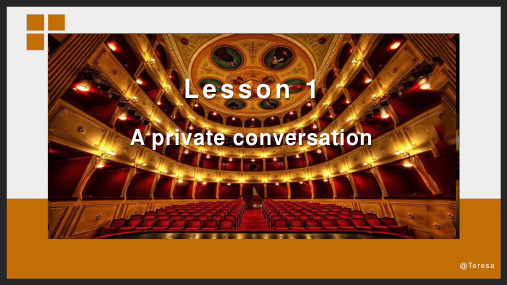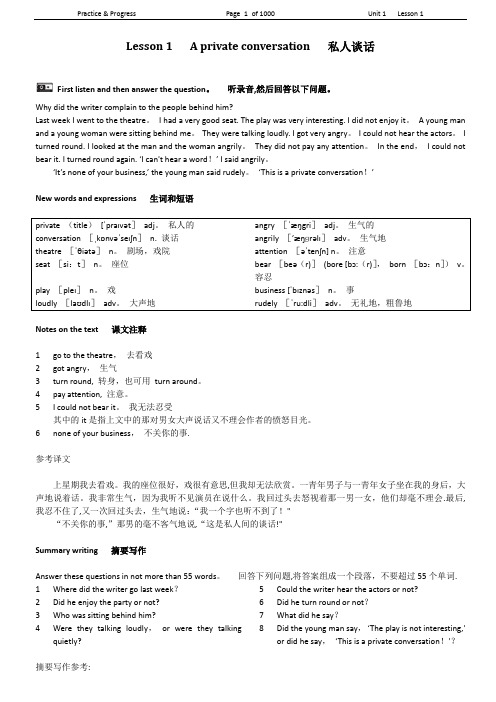Lesson 1-12 Conversation Practice
新概念英语第二册Lesson1-Lesson2 A Private Conversation

11. business n. 事,生意 talk business 谈正事
12. rudely adv. 粗鲁地
形容词形式为:rude 粗鲁的
9. attention n. 注意
Attention,please! 请注意! pay attention to sb./sth. 注意人/某事
• 'It's none of your business,' the young man said rudely. 'This is a private conversation!'
Explain the text
1.重点短语:go to the+地点 表示去某地干嘛 eg: in hospital 住院 in the hospital 去医院 go to the school 去学校 go to school 上学 表明你的身份一定是学生,是去 上学的,而加了定冠词the之后表明你的身份不定了。 相同的还有church和hospital等。
• Until (prep.) 直到 • • Outside (adv.) 外面
• Ring (v.) (铃声,电话等)响
• Aunt (n.) 姑姑,婶婶,阿姨, 舅母
• Repeat (v.)重复
★outside
• adv. 外面 • 作状语 • He is waiting for me outside. • It is cold outsid. • ring(rang.rung) v.(铃、电话等)响 (刺耳的) • [注]这种响是刺耳的, 往往是提醒人做某事 • The telephone(door bell) is ringing. • 而风铃等响要用jingle • jingle(bell): (铃儿) 响叮当 • 给某人打电话 : ring sb. • Tomorrow I'll ring you. • 打电话(名) : give sb. a ring • Remember to ring me/remember to give me a ring • 戒指(名词) n
新概念第二册Lesson1 A private conversation详解

Lesson1 A private conversationprivate adj. 私人的conversation n. 谈话theatre n. 剧场,戏院seat n. 座位play n. 戏loudly adv. 大声地angry adj. 生气的angrily adv. 生气地attention n. 注意bear v. 容忍business n. 事rudely adv. 无礼地,粗鲁地Last week I went to the theatre. I had a very good seat. The play was very interesting. I did not enjoy it. A young man and a young woman were sitting behind me. They were talking loudly. I got very angry. I could not hear the actors. I turned round.I looked at the man and the woman angrily. They did not pay any attention. In the end, I could not bear it. I turned round again. "I can't hear a word!" I said angrily."It's none of your business," the young man said rudely. "This is a private conversation!"参考译文:上星期我去看戏. 我的座位很好, 戏很有意思, 但我却无法欣赏. 一青年男子与一青年女子坐在我的身后, 大声地说着话. 我非常生气, 因为我听不见演员在说什么. 我回过头去怒视着那一男一女, 他们却毫不理会. 最后, 我忍不住了, 又一次回过头去, 生气地说 : “我一个字也听不见了!”“不关你的事, “那男的毫不客气地说, “这是私人间的谈话!”美音:肯定I can否定I can't,它的/t/是吞进去的, 在读音上很难区别, 只能根据上下文来定The writer could not bear it. He could not ______ it.a. carryb. sufferc. standd. liftbear 忍受=standsuffer 遭受,忍受 (精神或肉体上)痛苦,suffer后面必须加一种痛苦I suffer the headache.(肉体上的痛苦)He often suffers defeat.(精神上的痛苦)(defeat n. 失败)单词:1 a.私人的:______________2 n.谈话:______________3 n.剧场,戏院:______________4 n.座位:______________5 n.戏:______________6ad.大声地:______________7a.生气的:______________8ad.生气地:______________9n.注意:______________10v.容忍:______________11n.事:______________12 ad.无礼地,粗鲁地:______________ 词组:默写课文:。
Lesson 1 A private conversation

A private conversation
@ Te r e s a
Austria National Opera House
Royal Opera House
opera
play drama
CONTENTS
01 W o r d s a n d E x p r e s s i o n s
n. 谈话
3. theatre / 'θiətə(r) /
n. 剧院,戏院
4. seat /si:t/
n . 座位
5. play /plei/
n. 戏
6. loudly /'laudli /
adv. 大声地
7. angry /'æŋgri/
adj. 生气的
8. angrily /'æŋgrili /
c. 变性:speech n. 讲话,谈话 make a speech 做演讲
④ chat n./v. 聊天(talk friendly) eg. We had a long chat about old times.
⑤ discuss v. 有着严肃目的的讨论discuss with sb= have a discussion n. 讨论
如:private citizen 普通公民;
拯救大兵瑞恩
private soldier 大兵
(1)adj. 私人的,私立的
。
私人信函__a_p_r_i_v_a_t_e_l_e_tt_e_r_____________
私立学校 a private school .
私下地 in private
.
She studies in a private school
新概念二第一课课件Lesson 1 A private conversation

4. seat n.座位 v.安排坐下,使就坐 have a seat/take a seat 就座 (比sit down更有礼貌) have a good seat 有一个好位置 辨析:seat/sit seat只做及物动词,sit可做及物动词也可做 不及物动词 be seated 坐着,坐下;位于
新概念英语 二
welcome
主讲老师:Arthur
新概念英语二
新概念英语第二册共计96课,分4个单元(每24课一 个单元)前两个单元是对新一语法的操练和重现;第三 个单元较难,是一些复合句,第四个单元为复习单元, 每单元有一个综合考试。 新二是我们学习英语的一个过渡,同时也是一个转变。 从一个会说日常英语的人转变成一个敢动笔进行基本写 作的人。以96篇小故事为素材,培养学生听、说、读、 写的基本能力,其优势在于扩充词汇、统揽语法、集合 实践、听说兼修。在掌握第一册基本语法的基础上,由 浅入深逐步讲解语法要点,使学习者轻松掌握枯燥的语 法;通过对句型结构的分析及对短语用法的讲解,使学 习者在真正的听说读写中运用地道的句型。
问题是你想要做什么
二、主语———动词 在这一句型中,动词为不及 物动词及不及物的动词词组。在有的句子中,不 及物动词可以有状语修饰。 1.The sun is rising. 2.I'll try. 3.Did you sleep well?(well做状语,修饰不及物 动词sleep) 4.The engine broke down. 注意:在此句型中, 有少数不及物动词表达被动含义,表达主语本身 所具有的特性,不用被动语态。 1.The book sells well. 2.The window won't shut. 3.The pen writes smoothly.
新概念二第1课 课文及答案

Lesson 1 A private conversation 私人谈话First listen and then answer the question。
听录音,然后回答以下问题。
Why did the writer complain to the people behind him?Last week I went to the theatre。
I had a very good seat. The play was very interesting. I did not enjoy it。
A young man and a young woman were sitting behind me。
They were talking loudly. I got very angry。
I could not hear the actors。
I turned round. I looked at the man and the woman angrily。
They did not pay any attention。
In the end,I could not bear it. I turned round again. ‘I can't hear a word!’ I said angrily。
‘It’s none of your business,’ the young man said rudely。
‘This is a private conversation!’New words and expressions 生词和短语private (title)[ˈpraɪvət]adj。
私人的angry [ˈæŋgri]adj。
生气的conversation [ˌkɒnvəˈseɪʃn]n. 谈话angrily [’æŋɡrəlɪ]adv。
生气地theatre [ˈθiətə]n。
2018新部编英语初一年级Go_for_it下册1-12单元(Units_1-12课文+翻译)

英语Go for it!七年级下册1 – 12单元(课文+翻译)Unit 1 Can you play the guitar? ------------------------------------------ P 2你会弹吉他吗?Unit 2 What time do you go to school? --------------------------------- P 3你几点上学?Unit 3 How do you get to school? ---------------------------------------- P 5你怎样到达学校?Unit 4 Don’t eat in class. --------------------------------------------------- P 6上课不要吃东西。
Unit 5 Why do you like pandas? ----------------------------------------- P 8你为什么喜欢熊猫?Unit 6 I’m watching TV. -------------------------------------------------- P 10我正在看电视。
Unit 7 It’s raining! --------------------------------------------------------- P 11正在下雨!Unit 8 Is there a post office near here? -------------------------------- P 13这附近有邮局吗?Unit 9 What does he look like? ------------------------------------------ P 15他长什么样?Unit 10 I’d like some noodles. -------------------------------------------- P 16我想要些面条。
Unit 12 第1课时 (Section A 1a-2d)(教学设计)-九年级英语全一册(人教版)
2.Can you tell me what happened?学生表现是否专注,能否用目标语言正确描述地点和表述功能。
2.Listen again and fill in theblanks.Work in pairs.Role conversation about Mary’s morning.Look at the pictures above and tell what happened to Mary this3.Listen again..Fill in the blanks with the correct forms of theThen listen again and check your answers.4.Fill in the blanks with the correct forms 4.Role-playA: What happened ?B: I overslept. By the time I got up, my brother had already gotten in the4.Make sentences about unexpected situation by using the information in 1a.5.Look at the picture6.Work on 2b and2c.Finish the tasksstory学生是否积极的参与听说训练,能否在1b活动中抓住意外情况的对话信息,能否在2a活动中领会指令,能否在活动中准确描述出所发生的事情,是否较好的运用了2.Listen and role-playthe conversation. .能否较好的运用过去完成时进行英语口语对话。
是否激活学生的思维,对所学学习方法进行迁移应用。
中职《商务英语听说》Unit-1--First-Conversation-1
['misiz]
Part B Oral practice
Ⅰ. Interpret the following sentences.
1. It is my great pleasure to meet you here.
Ⅲ. Situation: Go to a job interview and give some personal information.
name 25 years old graduate major business management be good at computer take a course French hobby sales manager 3 years experience in marketing
• It is my great pleasure to do… • hold a party • in one’s honor
Ⅱ. Repeat the important sentences.
1. You must be Mr. Walker from Sydney, Australia.
2. I am a secretary to the general manager. 3. I work at the Beijing Textile Company. 4. That’s very nice, thanks. 5. Let me put your luggage in the back.
你只闻到我的香水,却没看到我的汗水。
你否定我的现在,我决定我的未来!
(最新版)新概念第二册Lesson-1--A-private-conversation
business rudely attention
bear
Grammar
英语中共有三种句子结构:简单句、并列句和复合句。
英语中,只含有一个主谓结构并且句子各成分都只由单词 或短语构成的独立句子叫做简单句。 简单陈述句:叙述一件事情。 例如:I am a teacher. You are student. I go to school by bus in the morning.
熊
.
give sb. a bear hug
loud
adj.大声的
----
loudly
angrily rudely
adv.大声地
adv.生气地 adv.无礼地,粗鲁地
angry adj. 生气的 rude adj.粗鲁的
形容词变副词的规则: 1.一般情况下直接加“ly”,如quick---quickly, loud--loudly, glad—gladly, real-really, slow-slowly, careful-carefully 等。 2.以辅音字母加y结尾的变y为i,然后再加-ly,如happy---happily, easy-easily, busy-busily 3. 少数以 e 结尾的形容词,要去掉 e 再加 -ly 。例如: true-truly, terribleterribly,possible-possibly等。 但绝大多数以e结尾的形容词仍然直接 加-ly。例如:rude-rudely, polite-politely, wide-widely等。
She studies in a private school
Let's discuss this later in private
英语语音课教学设计【语音课教案】
英语语音课教学设计【语音课教案】Teaching Plan for English Pronunciation Practice 《英语语音》课程教学教案Unit 1 Basic Concepts: Syllables, Stress & Rhythm Unit 2 Consonants: Stops Unit 3 Consonants: Fricatives and Affricates Unit 4 Consonants: Nasals, Approximants & Literal(s) Unit 5 V owels: Front Vowels & Central V owels Unit 6 V owels: Back V owels Unit 7 V owels: Diphthongs Unit8 Stressed Syllables & Unstressed Syllables Unit 9 Stressed Words & Unstressed Words in a Sentence Unit 10 Strong Forms and Weak Forms Unit 11 Linking Unit 12 Rhythm of English Speech Unit 13 Types of Intonation in English Unit 14 Intonation Units of English Unit 15 Functions & Uses of English Intonation 概论English Phonemes Study 英语音素学习 1. Some concepts about phonology: 几个语音学的概念 1)letters: words spelling symbols. 字母:词语的拼写符号。
2) phonetic elements (phoneme1): voice elements in speaking. 音素:语音的要素。
- 1、下载文档前请自行甄别文档内容的完整性,平台不提供额外的编辑、内容补充、找答案等附加服务。
- 2、"仅部分预览"的文档,不可在线预览部分如存在完整性等问题,可反馈申请退款(可完整预览的文档不适用该条件!)。
- 3、如文档侵犯您的权益,请联系客服反馈,我们会尽快为您处理(人工客服工作时间:9:00-18:30)。
Lesson 1-14 Conversation Practice 1. Where are you going? Ni qu na3’r? 你去哪儿? 看 kan4 look at, watch(movie, football game, TV), read, visit 回 hui2 go back, return 做 zuo4 do 岁数 sui4shu year old 买 mai3 buy 葡萄酒 pu2tao jiu3 grape wine 生日 sheng1ri birthday 蛋糕 dan4gao1 cake 喜欢 xi3huan1 like 吃 chi1 eat 商场 shang1chang3 shopping mall 快乐 kuai4le happy
A: 你去哪儿? Ni qu na’r?
B: 我回我爷爷家。 Wo hui wo yeye jia.
A: 你回你爷爷家做什么? Ni hui ni yeye jia zuo shenme?
B: 看我爷爷奶奶。今天是我奶奶的生日。 Kan (visit) wo yeye nainai. Jintian shi wo nainai de shengri.
A: 你奶奶今年多大岁数? Ni nainai jinnian duo da suishu?
B: 她今年80了。 Ta jinnian 80 le.
A: 是吗?她身体还好吗? Shi ma? Ta shenti hai hao ma?
B: 还好,谢谢。 Haihao, xiexie.
A: 你给她买什么礼物了? Ni gei ta mai shenme liwu(present) le?
B: 我买了一瓶葡萄酒和一个生日蛋糕。 Wo mai le yi ping putao jiu he yi ge shengri dangao.
LCiA-Copyright 1A: 祝你奶奶生日快乐。 Zhu ni nainai shengri kuaile.
B: 谢谢。下星期一见。 Xiexie. Xia xingqi yi jian. (See you next monday)
A: 再见。 Zai jian.
2. Shopping 买东西 mai3 dongxi A: 您好。 Nin hao.
B: 你好。 Ni hao.
A: 您要点儿什么? Nin yao dian’er shenme?
B: 我想买一个生日蛋糕。 Wo xiang mai yige shengri dangao.
A: 要大的还是小的? Yao dade hai shi xiaode. (do you want a big one or small one)
B: 小的。 Xiao de .
A: 您看这个可以吗? Nin kan zhege keyi ma?
B: 可以。多少钱? Keyi. Duo shao qian?
A: 这个60块钱。 Zhege 50 kuai qian.
B: 太贵了。您有便宜点儿的吗? Tai gui le. Nin you pianyi dian’er de ma? (do you have anything cheaper?)
A: 有,这个40块钱。 You, zhege 40 kuai qian.
B: 好吧,要这个。给你钱。 Hao ba, yao zhege. Gei ni qian.
A: 您给我50,我找您10块钱。谢谢。
LCiA-Copyright 2Nin gei wo 50, wo zhao nin 10 kuai qian. Xiexie. B: 谢谢。再见。 Xiexie. Zai jian.
A: 再见。 Zai jian.
3. Getting to know each other A: 你好! Nihao!
B: 你好! Nihao!
A: 请问,你是语言学院的学生吗? Qing wen, ni shi yuyan xueyuan de xuesheng ma?
B: 是,你呢? Shi, ni ne?
A: 我也是。我叫John. 你叫什么名字? Wo ye shi. Wo jiao John. Ni jiao shenme mingzi?
B: 我叫Anni. Wo jiao Anni.
A: 你是哪国人? Ni shi na guo ren?
B: 我是加拿大人。你呢? Wo shi jianada ren. Ni ne?
A: 我是希腊人。你学习什么专业? Wo shi xila ren. Ni xuexi shenme zhuanye?
B: 我学习中文专业。 Wo xuexi zhongwen zhuanye.
A: 我也是。你学习中文几年了? Wo ye shi. Ni xuexi zhongwen ji nian le?
B: 三年了。 San nian le.
A: 我学习五年了。很高兴认识你。现在我要去上课。你星期几有时间,我们一起去喝咖啡好吗?
LCiA-Copyright 3 Wo xuexi wu nian le. Hen gaoxing renshi ni . xianzai wo yao qu shangke. Ni xingqi ji you shijian, women yiqi qu he kafei hao ma?
B: 好啊。我星期天下午有时间。 Hao a. wo xingqi tian xiawu you shijian.
A: 好,这是我的电话。星期天下午四点我们去喝咖啡。 Hao, zhe shi wo de dianhua (phone number). Xingqi tian xiawu si dian women qu he kafei.
B: 好,再见。 Hao, zaijian.
4. Visit a friend Knock Knock… A: 嘿,你好啊。 Hey, ni hao a!
B: 你好,你好! Ni hao, ni hao.
A: 最近怎么样? Zuijin (lately) zenme yang?
B: 还行。你呢?工作忙不忙? Hai xing. Ni ne? gongzuo mang bu mang?
A: 来来,坐下说。你喝什么? 咖啡还是茶? Lai lai, zuo xia shuo. Ni he shenme? Kafei hai shi cha?
B: 好,喝茶。最近身体不太好,还是喝茶吧。 Hao, he cha. Zuijin shenti bu tai hao. Hai shi he cha ba.
A: 身体不好?怎么了? Shenti buhao. Zenme le?
B: 没什么。感冒。现在好了。 Mei shenme. Ganmao. Xianzai hao le.
A: 天气冷。感冒的人很多。我女朋友感冒吃了半个月中药。 Tianqi leng. Ganmao de ren hen duo. Wo nv pengyou ganmao chi le ban ge yue zhongyao. (my girlfriend got a cold and took Chinese medicine for half a month.)
B: 我吃不了中药。医生给我开了点儿DEBON。你女朋友现在怎么样? Wo chi bu liao zhongyao. Yisheng gei wo kai le dian’er debon. Ni nv pengyou xianzai zenme yang?
LCiA-Copyright 4A: 她还好。给你茶。 Ta hai hao. Gei ni cha.
B: 谢谢。你忙什么呢,最近? Xiexie. Ni mang shenme ne, zuijin?
A: 没忙什么。每天公司家,家公司。 Mei mang shenme. Meitian gongsi jia, jia gongsi.
B: 我来是想问你个事儿。 Wo lai shi xiang wen ni ge shi’er. (I’m here to ask you about something.)
A: 什么事儿? Shenme shi’er.
B: 我想买一个电脑。你是玩儿电脑的,你说买什么好? Wo xiang mai yige diannao(PC). Ni shi wan’er diannao de.(you are in the computer business or you are good at computer). Ni shuo mai shenme hao? (you say what is good to buy)
A: 你想买多少钱的? Ni xiang mai duoshao qian de? (how much money you want to spend?)
B: 五六百的。 Wu liu bai de .
A: hmmm, 买个DELL的吧!我们公司都用DELL的。很好用。也不贵。 Hmmm, mai ge DELL de ba! Women gongsi dou yong DELL de. Hen hao yong. Ye bu gui.
B: 去哪儿买呢? Qu na3’er mai ne?
A: 去PLASIO。那儿东西多。明天是星期六。我休息。我跟你去。 Qu plasio. Na4’er dongxi duo. Mingtian shi xingqi liu. Wo xiuxi. Wo gen ni qu.
B: 那太好了。明天几点? Na tai hao le. (na=that, here means etsi, like that). Mingtian ji dian?
A: 下午两点好吗? Xiawu liang dian hao ma?
B: 好。明天下午两点我来找你。 Hao, mingtian xiawu liangdian wo lai zhao ni.
LCiA-Copyright 5
